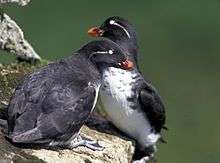auk
English

Etymology
From Icelandic álka, from Old Norse alka (“auk”), from Proto-Germanic *alkǭ, from Proto-Indo-European *h₁el- (“a kind of bird”). Cognate with Swedish alka (“auk”), Norwegian and Danish alke (“auk”), Swedish dialectal alla (“long-tailed duck”) (Clangula hyemalis, syn. Fuligula glacialis), Latin olor (“swan”), Ancient Greek ἐλέα (eléa, “marsh-bird”), Welsh alarch (“swan”).
Pronunciation
- IPA(key): /ɔːk/
- Homophone: awk
Noun
auk (plural auks)
- Any of several species of Arctic sea birds of the family Alcidae.
- 2018, Louise Tickle, The Guardian, 20 June:
- Further afield, these auks are also in dire straits: Norway has seen vertiginous crashes, with hundreds of thousands of adult puffins in the once-teeming colony of Røst struggling to fledge any chicks in recent years.
- 2018, Louise Tickle, The Guardian, 20 June:
Synonyms
Translations
Estonian
Etymology
From Proto-Germanic *augô. Cognate to Finnish aukko, Livonian ouk and Votic aukko.
Declension
| singular | plural | |
|---|---|---|
| nominative | auk | augud |
| genitive | augu | aukude |
| partitive | auku | auke / aukusid |
| illative | auku / augusse | aukudesse |
| inessive | augus | aukudes |
| elative | august | aukudest |
| allative | augule | aukudele |
| adessive | augul | aukudel |
| ablative | augult | aukudelt |
| translative | auguks | aukudeks |
| terminative | auguni | aukudeni |
| essive | auguna | aukudena |
| abessive | auguta | aukudeta |
| comitative | auguga | aukudega |
Gothic
Icelandic
Pronunciation
- IPA(key): [øyːk]
- Rhymes: -øyːk
Derived terms
- að auki, þar að auki (besides, moreover)
- auk heldur
- auk þess heldur, aukin heldur
- auk þess
Inuktitut
Old Norse
Alternative forms
Etymology
From Proto-Germanic *auk (“also”). Cognate with Old English ēac, Old Frisian āk, Old Saxon ōk, Old High German ouh, Gothic 𐌰𐌿𐌺 (auk).
Tocharian B
Etymology
From Proto-Indo-European *h₁ógʷʰis. Cognate with Ancient Greek ὄφις (óphis) and Sanskrit अहि (ahi).
Westrobothnian
Etymology 1
From Old Norse auka, from Proto-Germanic *aukaną. Akin to English eke, Danish øge, Gothic 𐌰𐌿𐌺𐌰𐌽 (aukan), Latin augeō, Latvian augt.
Pronunciation
- IPA(key): /èʊ̯ːk/ (example of pronunciation)
- Rhymes: -ɞ̀ɵ̯ːk
Etymology 2
From Old Norse eykr, from Proto-Germanic *jaukiją.
Pronunciation
- IPA(key): /éʊ̯ːk/ (example of pronunciation)
- Rhymes: -ɞ́ɵ̯ːk
References
- Rietz, Johan Ernst, “Auk”, in Svenskt dialektlexikon: ordbok öfver svenska allmogespråket [Swedish dialectal lexicon: a dictionary for the Swedish lects] (in Swedish), 1962 edition, Lund: C. W. K. Gleerups Förlag, published 1862–1867, page 15